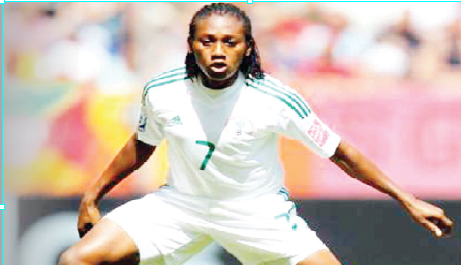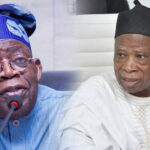
Former Super Falcons star and assistant coach of Heartland Queens, Stella Mbachu, in this interview with ANTHONY NLEBEM, shares her views on the fall of Falcons in Africa, lesbianism in women’s football, racism, equal pay for footballers and more. Excerpts
The Super Falcons are fast losing their reputation as Africa’s number one team. What do you think is responsible for the fall?
We are still the best in Africa; it has not gone away from us. What we see now is that we have challenges, first our preparations for major tournaments. We don’t prepare the Super Falcons adequately for major tournaments. The players are not well taken care of; we need to focus more on the welfare of the players, so that they can do better at every tournament they participate in. I could remember then coaches used to mix the team with home-based and overseas-based players and we had a solid team. But these days, the coaches are only interested in picking overseas-based players to play for the Super Falcons and that approach is not the best for our women’s football. You can’t select the players that play abroad and drop the local players, it’s best to have both in the national team to encourage the younger and up-and-coming home-based players to do better. They are the ones that will take over in future. When you import players from Europe to play for the national team, you will not get the desired results. Although we had players in my time that played in Europe playing for the Super Falcons, it’s not as rampant as we have today. The bulk of the players are from the local leagues and we train with the coaches here, they know about our fitness and style of football. As a coach, it makes your job easier if you know how your players play, their strengths and weaknesses.
What’s your assessment of the Nigerian women’s league when you played and now?
The women’s league during our playing days was more vibrant than what we have now. Then we had good clubs like Jegede Babes, Ufoma Babes, Rivers Angels, Pelican Stars, FCT Queens and many others. The Super Six then was like a war and when you played home and away, it was like going to the battlefield, the stadium was filled up with fans watching all the games. All the talents in the national team were based here in Nigeria, except for about three or four players playing outside the country. For me, that is the reason our league is not growing. I also recall that we had sponsors for the league; the league was well organised. Super Four, Super Six, FA Cups and the other tournaments were super organised. In my rating, our league was better managed and solid than now, players were on ground and getting a draw in an away match was like you had gotten all the three points. The leagues and clubs were more solid than what we have today, every player was working hard for a national call-up to either the Super Falcons or the U-20 and the competition was very high, unlike now. There is no more passion, but Aisha Folade is working hard to revive the league and gradually the league will get better. They should also train the coaches on refresher courses outside the country
The Flamingos will be travelling to India for the World Cup. What are their chances at the tournament?
I expect them to go there and win the World Cup for Nigerians. It’s time for us to do it and I believe the girls can do it. I have confidence in the coaching crew and the team to fly the Nigerian flag high in India.
What’s your take on foreign coaches for the Super Falcons?
I don’t believe in hiring a foreign coach for the Super Falcons. Forget about a white coach, let’s support our local coaches and they will perform better than the foreign coaches.
How about your view about the disparity in male and female footballers’ welfare packages in Nigeria?
Football is football; it’s not about male and female. Why must male players earn more than the female players? Is it not the same round leather ball, the same pitch that everyone play on? There should not be anything like a male player getting more money than the females. Some countries have started changing that narrative. The US and Sweden have cancelled that and China is about to do the same, even South Africa here has abolished it. I believe that both male and female players should earn the same because football is the same thing everywhere, the strength.
What’s your position on football racism?
During my playing days, I never paid attention to fans’ racist chants. Honestly, it does not bother me. My concern is to go to the pitch, play according to my coach’s instructions, do my best and make sure I shine. Racism has returned to football fully and some countries are using that opportunity to abuse players. I will advise players to ignore any form of racist comments because I don’t see racism stopping soon. FIFA is not serious about it; they need to caution the opposing fans, players and the teams. But if the world governing body is serious about it, racism would have reduced drastically in football.
Who is the toughest player you played against?
The toughest player I played against is Kikelomo Ajayi, a solid defender during her days with the Super Falcons. I remember very well when we were preparing for the World Cup and all of us came to fight for jerseys. Whenever I played against her from the outside right, she normally gave me tough time to, it was hard dribbling her. But when I played against other defenders, I always had space to move and launch an attack. Kikelomo was the only defender in my days that could stop me from moving with the ball. But at international level, it’s only the US full-backs that always disturbed me, because then our midfielders didn’t distribute the balls to us, they choked us more in the centre and made it very difficult for me to operate from the flanks. But in Canada, Sweden, and China I used to dribble their defenders very well.
Lesbianism has been a major issue in women’s football. Was it rampant during your time?
I can’t say if lesbianism was rampant or not during my playing days, but I can confirm that we had it at that time too. But the coaches at that time preached against it and discouraged us from the act, telling us the act is evil and we can’t use that to play football. Every player at that time was informed about it and the disadvantages of practicing lesbianism. That is why it was not that rampant in our time.
Is it true that women footballers don’t make good wives?
No, I don’t agree with that. We have Mercy Akide, a women’s football star and she is married. We have female footballers that are married and are good wives. The likes of Florence Omagbemi, Nkechi Egbe are married and are good wives to their husbands. It depends on what you want, not when you marry the wrong person. Just like every other person in marriage, when you don’t get your own person, it will give you a problem, both of you will not flow very well. But when you marry the person that you love and want to stay with, everything will work well.





